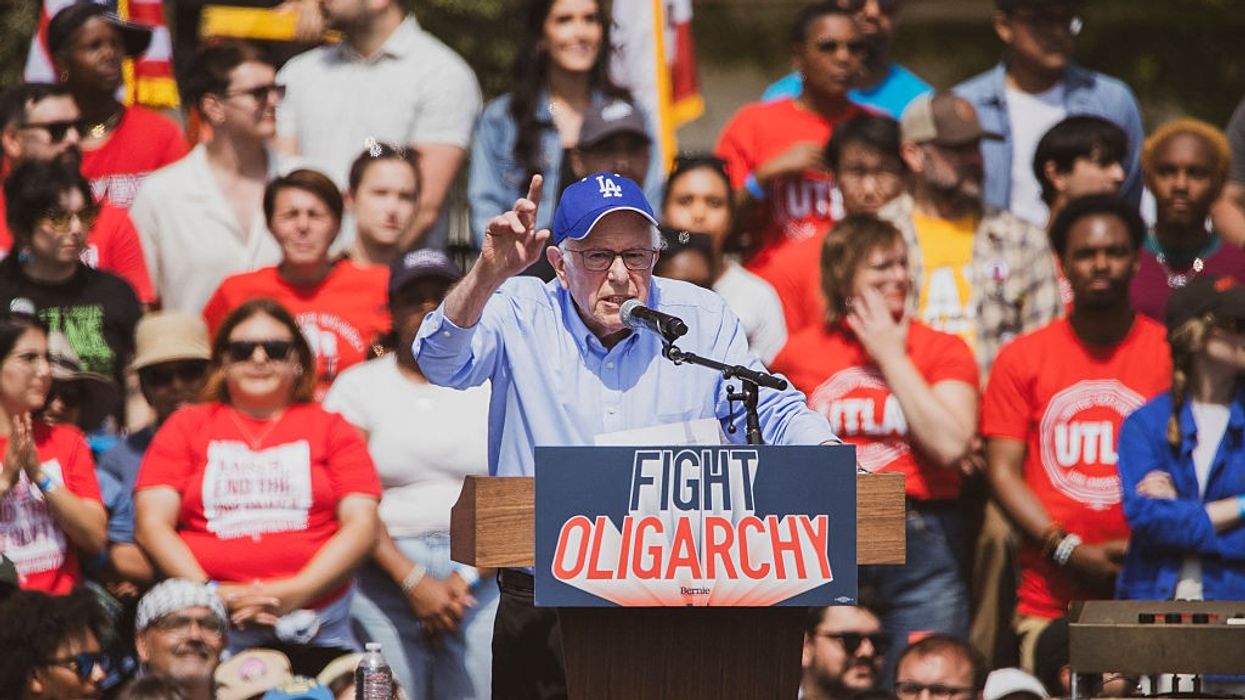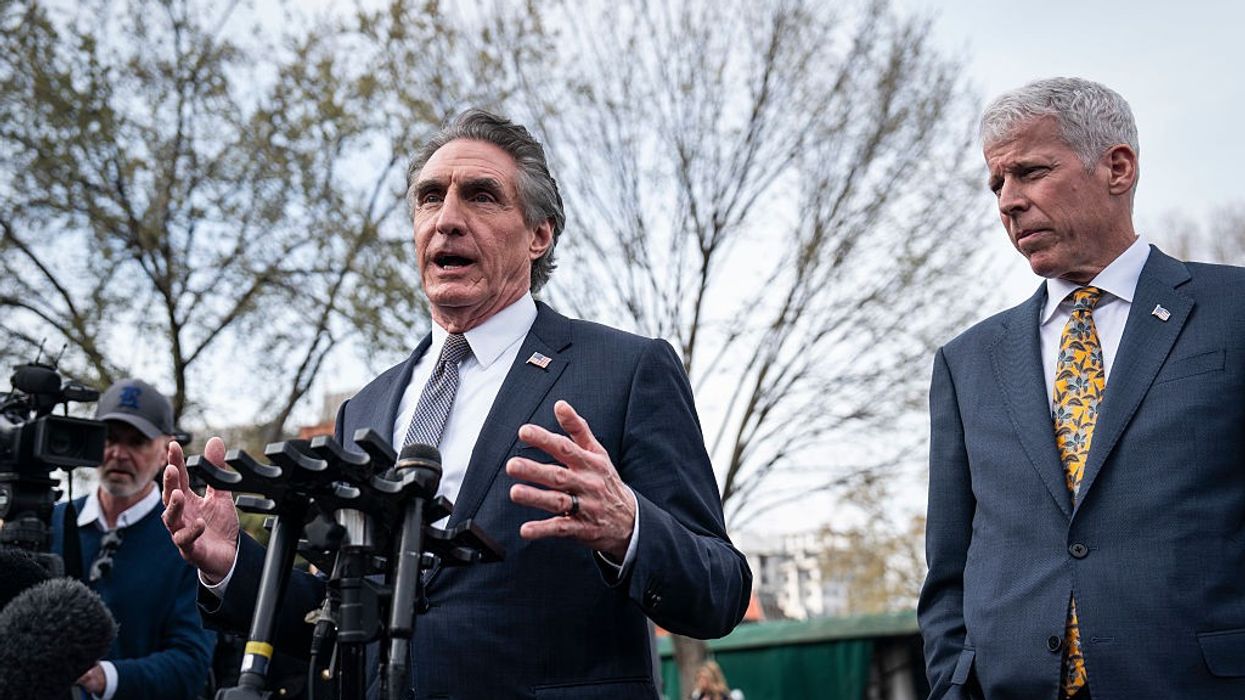Instead of getting bogged down in debates over wealth and income inequality or harnessing growing outrage over the hold that the superrich have on the US political system, Klein and Thompson advised the party to reach out to voters by pushing to end the "stifling bureaucratic requirements that killed private sector innovation."
Reining in "burdensome government processes" like environmental and tenant safety regulations—not fighting for programs that would benefit everyone in the US regardless of their wealth or income—was the key to securing "abundance for all," said the authors and their supporters in government, such as Reps. Ritchie Torres (D-N.Y.) and Josh Harder (D-Calif.).
But in addition to beginning their book with a "glaring error," said the authors of a new report by the government watchdogs Revolving Door Project (RDP) and Open Markets Institute on Tuesday—asserting that "supply is how much there is of something" without accounting for the fact that private corporations decide how much of a product they want to sell to make a profit—Klein and Thompson ignore the fact that long before they put pen to paper, right-wing politicians and think tanks were already pushing an "abundance" agenda.
"When abundance-supporting politicians are asked about it, Klein's name is often the first word out of their mouth," said Jeff Hauser, executive director of RDP. "But this obscures the powerful coalition of political pundits, politicians, and think tanks that have painstakingly constructed a national movement around 'abundance' for years before the publication of this book. These interested parties have taken on the more detail-oriented work of actually producing policy for abundance, and it is often far more conservative and destructive than implied in Klein and Thompson's superficial tract."
Klein and Thompson rely on a "dishonest or sloppy" interpretation of the National Environmental Policy Act (NEPA), which they equate with a permitting law and claim requires drawn-out environmental impact reviews, to make their argument that approvals for new infrastructure should be less cumbersome, said RDP.
The law requires the government to assess environmental impacts before developers can build major infrastructure, and has been heralded as a bedrock environmental statute—but it had been a target of the fossil fuel industry and the policymakers that do its bidding long before "abundance" proponents took aim at NEPA.
"When abundance-supporting politicians are asked about it, Klein's name is often the first word out of their mouth. But this obscures the powerful coalition of political pundits, politicians, and think tanks that have painstakingly constructed a national movement around 'abundance' for years before the publication of this book."
Proponents of "permitting reform"—a tenet of the abundance movement—claim that NEPA is a barrier to clean energy development, but the report finds that renewable energy projects are typically delayed for other reasons and that NEPA oppenents' frequently cited examples of "four- to ten-year timelines to complete a NEPA analysis are the exception, not the rule," as University of Utah law professor Jamie Pleune found in a 2023 Roosevelt Institute report.
Quoting Pleune, the report—titled Debunking the Abundance Agenda—notes that "most delays in the NEPA process are functional, not regulatory."
Pleune explained that most sources of delay are "insufficient staff, unstable budgets, vague or incomplete permit applications, waiting for information from a permit applicant, or poor coordination among permitting authorities." Such delays, however, "can be addressed without eliminating environmental standards, analytical rigor, or community engagement."
RDP's report recounts efforts by former right-wing Democratic Sen. Joe Manchin of West Virginia to pass permitting reform legislation in 2022-23, as the Biden administration fought to pass the Inflation Reduction Act, in the interest of getting approval of the controversial Mountain Valley Pipeline fast-tracked.
The Fiscal Responsibility Act, which raised the debt limit, expedited the MVP's approval, and codified a number of changes to NEPA—including arbitrary time limits on environmental impact assessments—came out of Manchin's efforts.
NEPA has been credited with protecting crucial wetlands near an industrial facility that was built with with American Recovery and Reinvestment Act funds; providing a process to explain to the public in Stephentown, New York the greenhouse gas savings that could be achieved if the area's new electrical grid shifted away from fossil fuels-based frequency regulation technology; and ensuring soil and groundwater contamination would be remediated ahead of the construction of a senior living facility in Kansas City, Missouri.
But as RDP noted, throughout Manchin's efforts to roll back environmental assessment requirements and pave the way for the MVP, "abundance proponents... criticized progressive skeptics who warned that weakening environmental review procedures would likely benefit the fossil fuel industry most of all."
Klein argued that “stream-lined permitting will do more to accelerate clean energy than it will to encourage the use of fossil fuels,” because "a simpler, swifter path to construction means more for the clean energy side of the ledger."
He claimed that Democratic opponents to right-wing "permitting reform" legislation lacked their own solutions for expediting the construction of clean energy projects—but soon after he made those claims, lawmakers including Reps. Mike Levin (D-Calif.) and
Sean Casten (D-Ill.) introduced a bill "that would expedite the green transition by facilitating quicker construction of interregional transmission lines, incentivizing renewable energy production on public lands and in federal waters, and increasing grid reliability—all while enhancing community engagement and without giveaways to the fossil fuel industry."
As RDP senior researcher and report co-author Kenny Stancil said, "Abundance advocates erroneously blame environmental review for hindering the clean energy transition, for example, but they have little to say about the real causes of delay, including privately owned utilities' profit-driven opposition to building interstate transmission lines, investors' prioritization of short-term oil and gas profits, and interference from fossil fuel-backed politicians."
The RDP report also points to Klein and Thompson's "indiscriminate anti-regulatory ethos" in regards to their arguments about housing supply, which they argue should be increased by reforming land use policy and loosening zoning rules.
"We agree that it’s a good idea to increase housing supply, and that liberalizing zoning rules is necessary in many places (especially in affluent, low-density suburbs, important locations the book ignores almost entirely)," reads the report. "However, abundance advocates seem to lose their way when they begin to veer away from arbitrary restrictions on housing construction... towards regulations that—in their mind—impede housing development. For instance, zoning can keep polluting industrial activities away from residential areas and ensure adequate infrastructural capacity like water, sewers, schools, and hospital beds for a community."
Klein and Thompson claim that requirements for air filtration systems in housing next to highways raise construction costs and contribute to homelessness, and suggest tenant protections could contribute to housing shortages by making "landlordism less profitable."
"In both cases, abundance proponents prioritize aggregate housing supply above all else, spending little time examining the real
world impact of their policy prescriptions," writes RDP. "What percentage of overall construction cost is the addition of a HEPA air filtration system? Will this requirement truly result in increased homelessness? How much? What are the potential long-term health
benefits and financial savings from having these residents breathe cleaner air? Will this requirement begin to alleviate the dire
racial disparities seen in asthma rates? These questions go unanswered in Klein and Thompson's book."
The Abundance authors also support eliminating land-use regulations in disaster-prone areas, even as hurricane and wildfire threats intensify—a policy that would "not only imperil human life, but it will result in post-disaster housing crises and could threaten the stability of crucial financial institutions."
The real estate investors the abundance movement focuses on maximize profits, which do not always correlate with construction output, said RDP—and centering the interests of landlords and developers who aim to cut construction costs distracts from what RDP calls the only solution that would provide affordable housing for all: social housing, or community-owned housing that exists outside of the private real estate market.
The report details how—although Thompson and Klein may identify themselves as liberals—their abundance worldview mirrors that of commentators and policymakers on the right, from the libertarian Niskanen Center to Trump's own appointees.
The stated mission of Trump's National Energy Dominance Council, chaired by Energy Secretary Chris Wright and Interior Secretary Doug Burgum, couches its mission in the language favored by the Abundance authors, calling for "improving the processes for permitting, production, generation, distribution, regulation, and transportation across all forms of American energy"—and has been praised by abundance enthusiasts like author Matt Yglesias.
The administration has also expedited permitting for liquefied natural gas exports while undertaking permitting reforms against clean energy.
"As the report explores, abundance talking points have already been adopted by Trump's energy appointees to justify new fossil fuel projects, while circumventing public participation and transparency in the environmental review process," said Hannah Story Brown, RDP research director and co-author of the report. "With the Trump administration, the Republican-led Congress, and right-wing Supreme Court advancing their attacks on bedrock environmental law, Abundance proponents are sounding more like their echo than their opposition."



